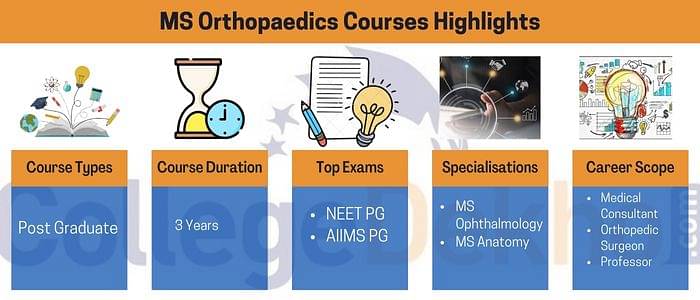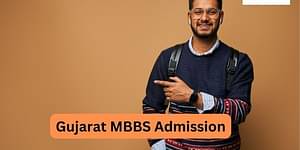MS Orthopaedics
MS Orthopaedics Overview
Master of Surgery in Orthopaedics or MS Orthopedics is a three-year postgraduate course that can be pursued after the successful attainment of an MBBS degree. It is a branch of surgery concerned with conditions affecting the musculoskeletal system of the human body. The course adheres to a similar theoretical framework because it is part of the Master of Surgery programme. The study of chronic, acute, traumatic, and overuse injuries, as well as other musculoskeletal system problems, is one of the most popular specialties in the MS Orthopaedics degree.
To be eligible to pursue MS orthopaedics courses, students must pass entrance exams like NEET, PGIMER, AIIMS PG, JIPMER PG, etc. Most of the courses are offered offline, while a few institutions in India deliver online courses in English. Some of the top colleges in India offering MS orthopaedics courses are Christian Medical College, AMU, Kasturba Medical College, AIIMS, JIPMER, etc. On average, the course fee ranges from INR 10 to 60 lakhs per annum. Graduates of this field earn a decent salary starting from 4.6 lakhs to 26.9 lakhs depending upon the job profile and experience history.
Table of Contents
- MS Orthopaedics Overview
- MS Orthopaedics Courses Highlights
- Why Choose MS Orthopaedics?
- Types of MS Orthopaedics Courses
- Entrance Exams for MS Orthopaedics Courses
- Eligibility Criteria for MS Orthopaedics Courses in India
- Documents Required for MS Orthopaedics Admission
- How to Get Admission to MS Orthopaedics Courses?
- Popular MS Orthopaedics Colleges in India
- Study MS Orthopaedics Courses Abroad
- MS Orthopaedics Abroad Top Colleges
- Top MS Orthopaedics Colleges by State & City
- MS Orthopaedics Course Fees
- MS Orthopaedics Syllabus
- MS Orthopaedics Course Curriculum
- Best Books for MS Orthopaedics
- MS Orthopaedics in India - Career and Job Prospects
- What is the Salary of an MS Orthopaedic Graduate?
- Skills That Make You The Best MS Orthopaedic
- FAQs about MS Orthopaedics
MS Orthopaedics Courses Highlights
Check out the significant highlights of the MS orthopaedics courses below:
Name of the Course | Master of Surgery in Orthopaedics |
|---|---|
Level | Post Graduate |
Duration | 3 Years |
Exam Type | Annual |
Minimum Qualification Requirement for MS Orthopaedic | MBBS degree from any college or university approved by the Medical Council of India (MCI). |
Average Initial MS Orthopaedic Salary | INR 10 to 60 Lakhs Per Annum |
MS Orthopaedic Selection Process | Entrance Exam, Counselling and Personal Interview |
Popular MS Orthopaedic Entrance Exams | PGIMER, AIIMS PG, JIPMER PG, NEET PG |
MS Orthopaedic Similar Specialisations in India | MS (Ophthalmology), MS (Anatomy), MS (General Surgery), MS (Obstetrics & Gynaecology), etc. |
Minimum Aggregate Required for MS Orthopaedic Admissions | 55% |
Major MS Orthopaedic Recruiters | UPSC, Ganga Hospital, Vellore Christian Medical College, AIIMS, Apollo Hospital, etc. |
Top MS Orthopaedic Colleges in India | Christian Medical College, AMU, Kasturba Medical College, AIIMS, JIPMER, etc. |

Why Choose MS Orthopaedics?
There are several reasons why one should choose a career in MS orthopaedics. It is the best choice for students for the reasons mentioned below:
-
Students are kept up to date with the most recent and cutting-edge medical technologies and breakthroughs by MS Orthopaedics.
-
Making the right choice at the appropriate time is MS Orthopaedics' most potent tool.
-
It aids in instilling a variety of qualities in the students, including focus, perseverance, reasoning, and analysis.
-
It improves emotional stability so that one may handle even the most trying circumstances without losing their faculties.
-
By allowing them to utilise practical skills, it aids students in their intellectually stimulating process.
-
It teaches students about civility and the best ways to serve people.
Types of MS Orthopaedics Courses
As discussed, MS Orthopaedics is a three years postgraduate course that primarily deals with the Musculoskeletal System. Both education and knowledge are given at the very first stage following the registration of the candidates (Surgical and Non-Surgical). Students can acquire surgical medical science, including tumours, congenital disorders, sports injuries, treatment of musculoskeletal trauma, infections, and many other degenerative diseases, in this comprehensive three-year course programme.
The MS in Orthopaedics is one of those degrees that gives graduates a licence to practise medicine and surgery. It serves as a bridge to the realm of practical medicine.
Entrance Exams for MS Orthopaedics Courses
For admission to MS Orthopaedics, many entrance exams are held by various colleges and universities. Some of the popular entrance examinations for MS Orthopaedics are
| Exam | Date | Details |
|---|---|---|
| NEET PG | March 5, 2023 | NEET PG is a computer-based MCQ test that the National Board of Examinations administers to candidates seeking admission to a variety of graduate-level programmes, including MD, MS, and PG Diploma programmes in several fields. The exam is three hours long. |
| AIIMS PG | June 3, 2023 | For admission to various PG Courses, including MD, MS, DM, MDS, and M.Ch., AIIMS New Delhi administers an online computer-based entrance exam. The test has 200 questions and the exam duration is three hours |
| PGIMER | July 2023 (tentative) | This admission test is tailored for individuals pursuing MS, MD, MDS, and DM degrees. The Post Graduate Institute of Medical Education and Research, Chandigarh, administers this computer-based MCQ test. There will be 250 questions for MS and MD students, with a three-hour time limit. |
| JIPMER PG | March 3, 2023 | The Jawaharlal Institute of Postgraduate Medical Education and Research PostGraduate, Pondicherry, administers this online test. There are 19 MD courses and 5 MS courses available. The minimum eligibility requirement is an MBBS, and the exam lasts for three hours. |
Eligibility Criteria for MS Orthopaedics Courses in India
Prospective MS Orthopaedics applicants must complete their MBBS programme. They must possess this degree from a college or university that has been accredited by the MCI, with a minimum grade point average of 55% or above. The relevant entrance examinations must be passed with the least passing grade. Individuals from all age groups are free to enrol in this postgraduate degree. However, it is a must that candidates have finished their rotational internship during their MBBS programme and are permanently registered with MCI.
Documents Required for MS Orthopaedics Admission
The following documents are required of students for admission to MS orthopaedics courses:
-
Certificate of passing/graduation from the last qualifying degree examination
-
Migration certificate - a no objection certificate from the most recently attended institution
-
Marksheets of the most recent qualifying degree examination
-
Any documentary proof for date of birth
-
Character certificate (this is issued by the head of the university from which the student has obtained his qualifying degree)
-
Research proposal (if required/applicable)
-
Gap certificate (if any for study gap)
-
No objection certificate from the employer (if employed)
Note: Failure to submit the above certificates with an application may result in the application not being considered for admission.
How to Get Admission to MS Orthopaedics Courses?
All around India, different institutions and universities hold a variety of entrance exams for MS orthopaedics. The following is how the MS Orthopaedics application process is carried out in India:
-
Students who want to pursue higher education in this field must apply for the entrance exam and do well enough to receive a passing score (at least).
-
To pursue an MS in orthopaedics courses, students may decide on the best college and take the appropriate entrance exam required for individual college.
Once the applicants have passed the entrance exams, MS Orthopaedics admissions will begin. Here is how the seat allotment will be done:
-
The shortlisted students will receive a call to attend the counselling sessions held by the various institutions and universities.
-
A round of group discussion and a round of individual interviews will be included in the counselling session.
-
During these rounds, the students will be evaluated by a variety of medical professionals, and the general aptitude of the MS Orthopaedics candidates will also be assessed.
-
The university or college will then present a complete merit list with the names of the successful applicants on it. Such candidates will have their seats assigned, and admission procedures will be followed.
Popular MS Orthopaedics Colleges in India
As we have discussed the entrance exams for MS orthopaedics courses in India, let us talk a bit about the colleges offering them. The following are popular MS orthopaedics colleges in India:
-
PGIMER
-
Maulana Azad Medical College
-
Kasturba Medical College
-
Kasturba Medical College
-
K.S. Hedge Medical Academy
-
JIPMER
-
Govt. Medical College and Hospital
-
Christian Medical College
-
AMU
-
AIIMS
Study MS Orthopaedics Courses Abroad
Students can achieve perfection as a medical officer by persevering under challenging circumstances for three long years in this post-graduate degree called MS orthopaedics. Any student can work as a researcher, therapist, surgeon, sports medicine doctor, or even a medical consultant anywhere in the globe after earning a successful post-graduate degree in MD orthopaedics.
For those hoping to work in the medical industry, the MS Orthopaedics programme is quite challenging. This curriculum places a strong emphasis on the value of research in increasing students' understanding and advancing their education. Due to linguistic knowledge, it even provides a wide range of career opportunities abroad.
MS Orthopaedics Abroad Top Colleges
For employment, MS or MD degrees are not well-recognised in western countries like Australia, Germany, France, New Zealand, etc. In such cases, if graduates move abroad after completing MS orthopaedics in India, they will still be treated as MBBS degree holders.
To study in the UK, candidates must first pass the IELTS exam and then the Professional and Linguistic Assessment Board (PLAB). To study medicine in the United States, they must pass the United States Medical Licensing Examination (USMLE) in addition to English language proficiency tests. The following is a list of top colleges to study MS orthopaedics abroad along with their respective countries:
College/University |
Country |
|---|---|
|
Claremont Graduate University |
USA |
|
Queen Mary University of London |
UK |
|
University of Bradford |
UK |
|
University of Dundee |
UK |
|
University of Kent |
UK |
|
University of Liverpool |
UK |
|
University of Otago |
New Zealand |
|
University of Reading |
UK |
|
University of Sheffield |
UK |
|
Victoria University |
Australia |
Top MS Orthopaedics Colleges by State & City
The following are the top MS orthopaedics colleges in India segregated by their respective states and cities:
Karnataka |
|
|---|---|
|
College/University |
City |
|
Kasturba Medical College |
Manipal |
|
St John's Medical College |
Bangalore |
|
KMC |
Mangalore |
|
JSS Medical College and Hospital |
Mysore |
|
KS Hegde Medical Academy |
Mangalore |
|
JNMC |
Belagavi |
|
KLE University |
Belgaum |
|
NITTE |
Mangalore |
|
Adichunchanagiri University |
Mandya |
Maharashtra |
|
|---|---|
|
College/University |
City |
|
Dr D. Y. Patil Vidyapeeth |
Pune |
|
AFMC |
Pune |
|
Grant Medical College and Sir J. J. Group of Hospitals |
Mumbai |
|
GSMC |
Mumbai |
|
MGIMS |
Wardha |
|
MGM Medical College |
Navi Mumbai |
|
RTMNU |
Nagpur |
|
Bharati Vidyapeeth Deemed University |
Pune |
|
GMC |
Nagpur |
|
DYPES |
Kolhapur |
Tamil Nadu |
|
|---|---|
|
College/University |
City |
|
CMC |
Vellore |
|
Sri Ramachandra Institute of Higher Education and Research |
Chennai |
|
SRM Institute of Science and Technology |
Chennai |
|
Annamalai University |
Chidambaram |
|
Saveetha Medical College |
Chennai |
|
MMC |
Chennai |
|
PSG Institute of Medical Sciences and Research |
Coimbatore |
|
VMU Salem |
Salem |
|
GKMC |
Chennai |
Delhi NCR |
|
|---|---|
|
College/University |
City |
|
AIIMS Delhi |
New Delhi |
|
Jamia Hamdard University |
New Delhi |
|
VMMC |
New Delhi |
|
UCMS |
New Delhi |
|
LHMC |
New Delhi |
|
PGIMS |
Rohtak |
|
MAMC |
New Delhi |
|
Guru Gobind Singh Indraprastha University |
New Delhi |
|
Pandit Bhagwat Dayal Sharma University of Health Sciences |
Rohtak |
Uttar Pradesh |
|
|---|---|
|
College/University |
City |
|
BHU |
Varanasi |
|
KGMU |
Lucknow |
|
AMU |
Aligarh |
|
Teerthanker Mahaveer University |
Moradabad |
|
CSJMU |
Kanpur |
|
Santosh University |
Ghaziabad |
|
Bareilly International University |
Bareilly |
|
Swami Vivekanand Subharti University |
Meerut |
|
UPUMS |
Etawah |
West Bengal |
|
|---|---|
|
College/University |
City |
|
Kolkata Medical College |
Kolkata |
|
IPGMER |
Kolkata |
|
R. G. Kar Medical College and Hospital |
Kolkata |
|
CNMC |
Kolkata |
|
NBMC |
Darjeeling |
|
The West Bengal University Of Health Sciences |
Kolkata |
|
Burdwan Medical College & Hospital |
Bundwan |
MS Orthopaedics Course Fees
In India, MS orthopaedics course fees vary from one college to another. It may be more cost-effective to study at a government-based institute than a private one due to its availability of infrastructure and facilities at a low cost. The following table shows the course fees for MS orthopaedics:
University/College Name |
Average Fees Per Annum (in INR) |
|---|---|
|
AIIMS, Delhi |
10,000 |
|
Christian Medical College TN |
1.77 Lakhs |
|
Kasturba Medical College, Manipal |
34 Lakhs |
|
Maulana Azad Medical College, Mangalore |
15,000 |
|
PGIMER, Chandigarh |
3,300 |
MS Orthopaedics Syllabus
The MS orthopaedics syllabus is divided into two sections, namely, General Orthopedics and Traumatology. The following table presents the syllabus for both sections:
General Orthopaedics |
Traumatology |
|---|---|
|
Arthrodesis |
To clinically assess, diagnose, and initially manage all medical emergencies and surgical treatments |
|
Closed Reduction of Fractures and Dislocations |
To learn to assess ABC and perform CPR |
|
Congenital Anomalies |
Spine |
|
Debridement of Open Fractures |
To comprehend the use of certain emergency drugs like atropine, adrenaline, dopamine, analgesics, steroids, etc. |
|
Excision of benign lesions |
Biopsies |
|
External Fixator application |
Fractures and Dislocations |
|
Imaging in Orthopaedics |
Foot and Ankle |
|
Incision and drainage, acute Osteomyelitis/ Septic Arthritis |
The Hand |
|
Infections |
Arthroplasty |
|
Internal Fixation of minor fractures with K-wires |
Amputation |
|
Mastering Plastering Technique |
Surgical splinting of fractured or dislocated bones and limbs |
|
Microsurgery |
Sports Medicine |
|
Non-traumatic Disorders |
Regional Orthopaedics |
|
Operative Orthopaedics |
- |
|
Peripheral Nerve Injuries |
- |
|
Skull tongs application |
- |
|
Tendon lengthening |
- |
|
Tumours |
- |
MS Orthopaedics Subjects
The MS Orthopaedics course subjects are generally the same throughout all of the colleges, but they differ slightly depending on the university's course module. However, depending on the teaching approach, the subjects are generally presented in a different order but are very comparable fundamentally. Overall, the course gives them a unique approach to teaching, writing, and a thorough understanding of medical science.
Core Subjects:
-
Traumatology
-
General Orthopedics
Elective Subjects:
-
Informed Consent
-
Concept of Anatomy
-
Doctor-patient relationship
-
Palliative Care
-
Surgical research/innovation
-
Issues related to organ transplantation
MS Orthopaedics Course Curriculum
The MS orthopaedics course curriculum is divided into two parts: a required set of courses covering all areas of medical foundations and a collection of elective courses designed to develop knowledge and abilities for certain jobs.
The MS Orthopaedics programme is designed for those who want to specialise in the field of medicine. It also encompasses the study of surgical medical science, which covers the treatment of congenital disorders, musculoskeletal trauma, tumours, sports injuries, infections, and a variety of other degenerative diseases. The following are the semester-based MS orthopaedic courses:
MS Orthopaedics Syllabus for First Year |
|
|---|---|
|
Semester I |
Semester II |
|
Congenital |
Anomalies |
|
Imaging the Orthopaedics |
Other Non-traumatic Disorders |
|
Infections |
Tumors |
|
Operative Orthopaedics |
Surgical Techniques and Approaches |
|
Peripheral Nerve Injuries |
Microsurgery |
MS Orthopaedics Syllabus for Second Year |
|
|---|---|
|
Semester III |
Semester IV |
|
Mastering Plastering Techniques |
Debridement of Open Fractures |
|
External Fixator Application |
Internal Fixation of Minor Fractures with K-Wires |
|
Excision of Benign Lessons |
Skull Tongs Application |
|
Closed Reduction of Fractures |
Dislocations |
|
Arthrodesis |
Practical Works |
MS Orthopaedics Syllabus for Third Year |
|
|---|---|
|
Semester V |
Semester VI |
|
The Foot and Ankles |
Arthroplasty, Amputations |
|
Spine |
Sports Medicine |
|
Fractures and Dislocations |
Regional Orthopedics |
|
Clinical Diagnosis |
- |
Best Books for MS Orthopaedics
The subjects covered in the below-mentioned course module are more than sufficient. However, there are some books written and published by authors who have been open about their cognitive processes. These books can help in becoming more proficient and informed about geological facts, which is a significant component of MS orthopaedics subjects.
Name of the Book |
Author Name |
|---|---|
|
Clinical Orthopaedic Diagnosis |
Anil Kumar Pandey, Sureshwar Pandey |
|
Essentials of Orthopaedics |
Vikram Amhaskar, J Maheshwari |
|
Miller’s Review of Orthopaedics |
Stephen R. Thompson, Mark D. Miller |
|
Orthopaedic Imaging |
Adam Greenspan |
|
Recent Advances in Orthopaedics -2 |
P. Maxwell Courtney |
MS Orthopaedics in India - Career and Job Prospects
After completing a postgraduate programme in orthopaedics, candidates can work as practitioners in private hospitals, government hospitals, super-speciality clinics, rehabilitation facilities, nursing homes, and health centres. Additionally, they are eligible to apply for positions in the Armed Forces hospitals and rehabilitation facilities by taking the Combined Medical Service examination offered by the Union Public Service Commission (UPSC). With time and expertise under their belts, they may engage themselves in private practice. Furthermore, they can pursue research to mentor senior residents at hospitals while they write their theses.
Job Profiles for MS Orthopaedics
The aspirant can work in the public or private sectors after completing an MS Orthopaedics programme, based on their preferences or expertise. They even have the choice to expand their specialisation by pursuing a postgraduate degree, such as a doctorate, or even by taking additional full-time courses. The following are some of the top MS Orthopaedics career prospects in the private sector:
-
Critical Care
-
Orthopedic Surgeons
-
Medical Consultants
-
Orthopedic Professors
-
Clinical Associates
-
Orthopedic Assistants, etc.
Leading Recruiters for MS Orthopaedics
Many recruiters look for the most qualified orthopaedics doctor they can find. The extent and breadth of the scope also necessitate the involvement of several recruiters. The list of notable orthopaedic recruiters below includes the following names:
-
AIIMS
-
Apollo Hospital
-
CMC, Vellore
-
Fortis Hospital
-
Ganga Hospital
-
Government Medical Institutions
-
Kokilaben Dhirubhai Ambani Hospital
-
PGIMER
-
Private Medical Institutions
-
RML Hospital, Delhi
-
Tata Memorial Center
-
UPSC
What is the Salary of an MS Orthopaedic Graduate?
An orthopaedic graduate starts to benefit when they begin working professionally after years of hard work, keeping a strict schedule, discipline, and tremendous dedication. Their ability, talent, sincerity, attitude, and behaviour all affect how much they earn. At the beginning of their career, their pay is modest, just as in any other profession. However, when they gain expertise and a solid name in the industry over time, it increases.
The government's department of health determines an orthopaedist's salary scale in government hospitals. The recruiters always take the orthopaedist's skill, experience, and academic prowess into account when determining the compensation scale. The table below gives an idea of the salary range for an MS orthopaedist:
Job Role |
Job Description |
Estimated Average Annual Salary (in INR) |
|---|---|---|
|
Orthopaedic Surgeon |
Performing multiple operations and accepting the responsibility of emergency cases. |
12 Lakhs |
|
Paediatric Surgeon |
Treatment of disorders such as birth defects, traumas, surgical issues, and other conditions causing bone problems in young adults. |
13 Lakhs |
|
Clinical Associate |
Managing and overseeing all conducted clinical trials. They can work in private offices, clinics, etc. |
4.6 Lakhs |
|
Medical Consultants |
Providing patients with the correct guidance and occasionally treating them. |
7.8 Lakhs |
|
Orthopaedic Professors |
Teaching prospective students about orthopaedics and letting them know the entire knowledge covering every benefit and drawback. |
26.9 Lakhs |
Skills That Make You The Best MS Orthopaedic
An individual must develop a specific set of skills in any job to perform well at work. Similarly, a professional, in the field of orthopaedics, needs the following skill set:
Decision-Making: Your ability to make decisions is crucial since the patient's life depends on the careful and flawless surgery you perform. Be assured in the choices you make. Later regretting a decision is not an option in this industry.
Work Under Pressure: There are times when a patient may need urgent care, thus the individual must be capable of performing well under pressure. The person must be quick on their feet and capable of working under pressure as appropriate.
Patience and Stability: Being able to stand for several hours straight in operating rooms requires mental stability, physical health, and agility.
Informational Skills: Keep up with the most recent advancements in technology and medicine for improved patient care.
Technology Skills: A persistent desire to stay current with all the latest information in the field they are involved with should exist.
Interpersonal Skills: This ability is necessary for a person to interact with patients, personnel, and other members of an organisation. They have a responsibility to speak properly as experts in the field of orthopaedics.
Time Management: Time management is a necessary trait because it will be necessary for the person to act swiftly to treat patients and make judgments. They ought to be able to pinpoint the problem and organise the essential elements of the solution.
FAQs about MS Orthopaedics
What does MS ortho mean?
MS ortho means Master of Surgery in Orthopaedics or MS Orthopaedics, which is a three-year postgraduate course pursued after obtaining an MBBS degree from any college or university approved by the Medical Council of India (MCI). It encompasses the study of surgical medical science, which covers the treatment of congenital disorders, musculoskeletal trauma, tumours, sports injuries, infections, and a variety of other degenerative diseases.
Is MS orthopaedic considered a good career in India?
Yes, MS orthopaedic is considered a good career in India or rather it is one of the highest paying medical specialisations. An orthopaedic surgeon's starting salary may vary depending on their area of expertise and workplace, but on average, they earn between INR 10 to 60 lakhs per annum.
Is NEET required to pursue MS orthopaedics?
Yes, NEET is required to pursue MS orthopaedics. Students can choose to enrol in a three-year MS course in which they can choose to specialise in orthopaedic surgery by taking the NEET PG exam. However, students can also take other entrance exams like PGIMER, AIIMS PG, JIPMER PG, etc.
What is the selection process for MS orthopaedics courses?
The selection process for MS orthopaedics courses depends on the eligibility criteria of the minimum scores in the listed exams. If basic eligibility matches, then the colleges may conduct an entrance exam or require NEET-PG. The candidate is shortlisted after passing those with a good score. Depending on the fees specified by the institution, it is necessary to pay the fee with or without the loan.
What are MS orthopaedics courses all about?
MS orthopaedics courses is a three-year postgraduate programme. It is open to graduate students who have an MBBS degree from an accredited university. Students' ability to think critically and organise their thoughts to generate unique insights into the specifics of the procedure is enhanced by this course.
What does an MS orthopaedics graduate do?
Graduates with an MS in orthopaedics typically have a variety of job roles and career-related opportunities, since they are well-versed in the most essential languages. After graduating, the aspirant may choose to work for a Healthcare organisation or pursue further education and research.
Is there any scope for higher education after completing MS orthopaedics?
Yes, there is a wider score for higher education after completing MS orthopaedics. Doctoral degrees are most commonly pursued in this field, with students having the option of obtaining them in different specialisations. Here are a few of them:
-
PhD in Orthopaedics
-
Post Graduate Diploma in Orthopaedics
-
Diplomat of the National Board of Medical Exam in Orthopaedics (DNB)
Which teaching methodologies and techniques are used in MS orthopaedics?
The MS Orthopaedics course focuses on various areas of medical science. The MS Orthopaedics course subjects deal with prerequisites which help students gain maximum exposure to the profession. The following teaching methodologies and techniques are used in MS orthopaedics:
-
Following course module books
-
Internships
-
Projects
-
Assignments
-
Case studies/ Research work, etc.
Are MS orthopaedics projects compulsory?
Yes, MS orthopaedics projects are compulsory. At the end of the semester, each student must complete the MS Orthopaedics project, also known as a mini-thesis. Students should see their projects as the perfect opportunity to apply what they have learnt in the MS Orthopaedics programme to their future careers. The following are some project topics:
-
Treatment of Segmental Long Bone Loss with Ilizarov Ring Fixation
-
Short-Term Evaluation of Bipolar Hip Arthroplasty's Functional Results
-
Surgical Treatment of Unstable Pelvic Fractures: A Study
-
Traumatic central cord syndrome's motor neurological outcome
What are the areas of recruitment for MS orthopaedics?
The following are the areas of recruitment for MS orthopaedics:
-
Area Sales Manager
-
Customer Service Executive
-
Ophthalmologist
-
Anaesthetist
-
Commercial Assistant/Export Assistant
-
Medical Officer/Registrar, etc.
Depending on their interests, skills, and occupation choice, MS Orthopaedics graduates can pursue both public and private jobs in India.
Related Questions
Popular Courses
- Courses
- MS Orthopaedics


















